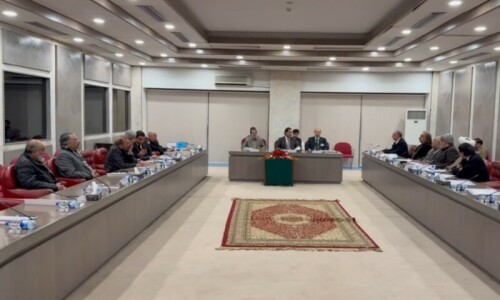ISLAMABAD: A record number of new Covid-19 cases has been reported in the capital in the last 24 hours, but the city’s focal person on Covid-19 has partly attributed the increase to surveillance and an efficient TTQ - tracing, testing and quarantine - system.
The number of new cases reported has doubled in just five days, from 57 reported on May 18 to 131 on May 22. District Health Officer Dr Zaeem Zia has claimed that there are a number of reasons for the increase.
A document from the National Command and Operation Centre (NCOC) on Covid-19 dated May 23, available with Dawn, stated that the total number of cases reported in the capital in the last 24 hours is 131. There were 13 cases reported in Azad Jammu and Kashmir, five cases in Gilgit-Baltistan and 124 cases in all of Balochistan - which has an area equal to almost half of the entire country - in the same period.
Of the new patients, 87 are male and 44 are female.
Dr Zia told Dawn that although it is correct that the number of Covid-19 cases has increased in the last few days, there are a number of reasons for this.
“Our surveillance is much better than other parts of the country, because of which more cases are detected. It is said that when one case is reported from an area, it should be considered the tip of the iceberg,” he said.
“We have introduced a TTQ system under which our teams have been visiting home to home to find suspected Covid-19 cases. This is why 44pc of the cases in Islamabad were detected by district administration teams and the remaining 56pcare cases that were tested at public and private laboratories and hospitals,” he added.
Dr Zia said that the government made the decision to open the lockdown in the interest of the public to give them the opportunity to earn, but people have taken it to mean the disease has been eliminated.
“The responsibility is on both the government and the people. The government has done its job by allowing people to make a living, and not it is the responsibility of the public to take precautionary measures. It is a two-way responsibility and we cannot get better results if only the government ensures its responsibility,” he said.
“We were getting around 60 cases per day, but the number of cases has suddenly started increasing which shows that people have begun interacting with each other again,” he said.
Dr Zia also urged people not to stigmatise patients of Covid-19.
“We get a number of calls almost daily saying we should shift patients of Covid-19 from their areas. It is a disease and we have to live with it,” he said.
But an official from the Ministry of National Health Services (NHS) who asked not to be named said that the number of Covid-19 patient has begun to increase because of the government’s decision to relax the lockdown.
“Unfortunately, we will observe a huge surge in cases in the coming days as markets and the places have been flooded with people and the public has stopped taking precautionary measures,” he said.
Published in Dawn, May 24th, 2020















































Dear visitor, the comments section is undergoing an overhaul and will return soon.